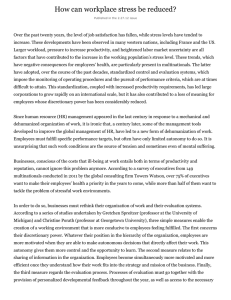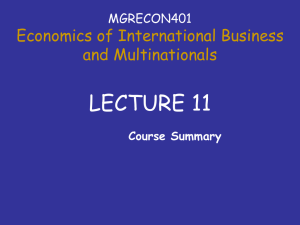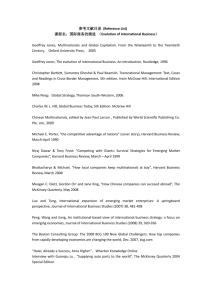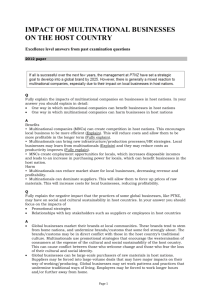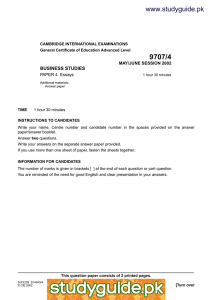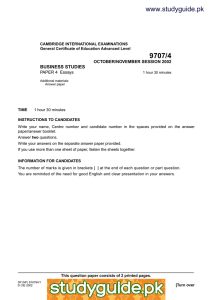www.studyguide.pk BUSINESS ORGANIZATIONS MARKET ECONOMIES
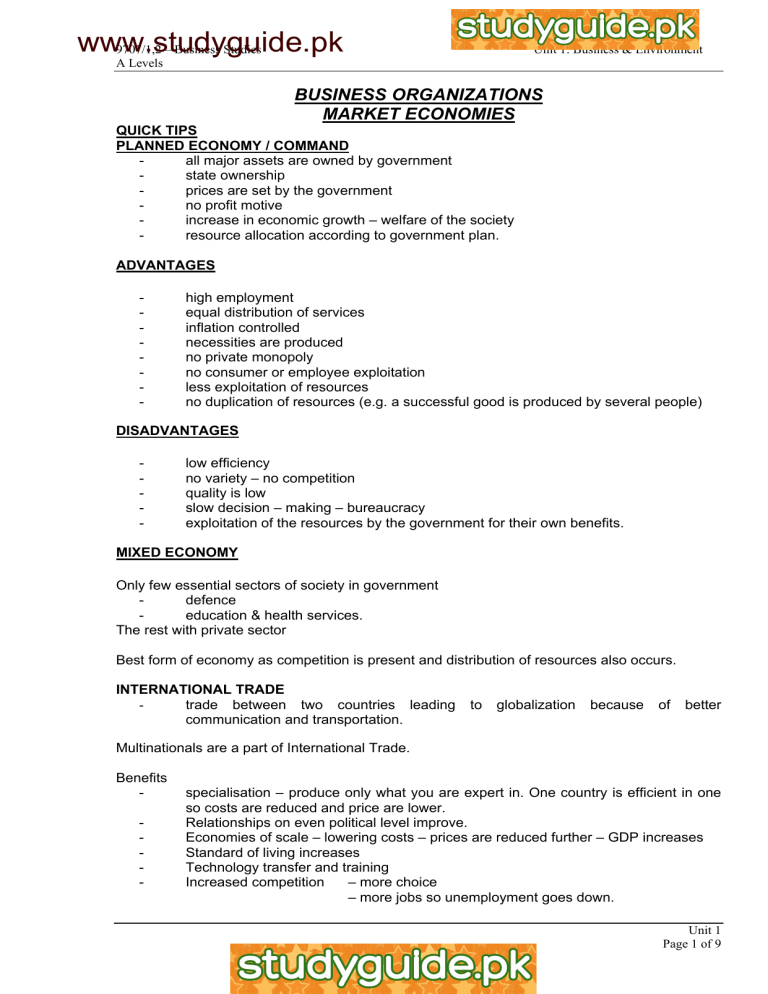
A Levels
BUSINESS ORGANIZATIONS
MARKET ECONOMIES
QUICK TIPS
PLANNED ECONOMY / COMMAND
- all major assets are owned by government
-
-
-
- prices are set by the government no profit motive increase in economic growth – welfare of the society resource allocation according to government plan.
ADVANTAGES
- equal distribution of services
-
-
-
- no private monopoly no consumer or employee exploitation less exploitation of resources no duplication of resources (e.g. a successful good is produced by several people)
DISADVANTAGES
-
-
-
- no variety – no competition quality is low slow decision – making – bureaucracy exploitation of the resources by the government for their own benefits.
MIXED ECONOMY
Only few essential sectors of society in government
- defence
- education & health services.
The rest with private sector
Best form of economy as competition is present and distribution of resources also occurs.
INTERNATIONAL TRADE
- trade between two countries leading to globalization because of better communication and transportation.
Multinationals are a part of International Trade.
Benefits
- specialisation – produce only what you are expert in. One country is efficient in one so costs are reduced and price are lower.
-
-
-
-
-
Relationships on even political level improve.
Economies of scale – lowering costs – prices are reduced further – GDP increases
Standard of living increases
Technology transfer and training
Increased competition – more choice
– more jobs so unemployment goes down.
Unit 1
Page 1 of 9
A Levels
Drawbacks:
1. Overspecialisation – restriction to one aspect so in case of war people are deprived of the good. Keep on gaining knowledge.
2. decline in domestic production
- difference to compete with foreign goods
3. Exploitation of labour by multinationals
4. diseconomies of scale
-
-
- difficult to control, communicate and co-ordinate finance problem as some country might have very high inflation too much hardwork
5. balance of payment deficit – exports are higher than imports
6. inflation – if demands becomes very high. If GDP increases living standard increase per capital income increases too much purchase
7. Dumping – when too many goods by foreigners are sold to us at very low prices our domestic industries is killed.
Protection Measures
-
-
-
- tariffs, taxes are imposed
Quotas – quantity is fixed in short limits
Embargo – complete ban of trade on a country
Voluntary Export limitation – countries themselves say that they won’t export more then a certain limit
MULTINATIONALS
They have a head office in one country while their operating branches and / or factories are in different countries
Government have to bear them because
-
- they provide employment they invest and so help in building economy
-
- they give tax revenues
ADV of Multinationals getting over the tariffs and import duties-reduce transport costs – nearness to the market – cheap labour
-
-
-
-
-
-
- economies of scale – lower costs of production
Transportation
Cost / unit market knowledge is better nearness to natural resources / rawmaterials diversification – reducing risks – compensation of losses influence the government policies government grants if it wants to attract investors expansion of profits.
DISADV of Multinationals
-
-
-
- a percentage of profits as well as taxes to the government (payments) to maintain quality standards, they need to train, so high costs.
Language and cultural differences
Difference in economies – e.g. working in a country which is developing and
- underdeveloped
Co-ordination and communication is difficult
Unit 1
Page 2 of 9
A Levels
ADV for the host country
4.
6. standard of living improves quality and efficiency
8. increases variety and choices
10. better trained labour
11. revenue to the government
12. foreign investments increase
13. relationships between host and guest companies improve politically and economically
14. balance of payment surplus
DISADV for the host country
1. decline in domestic industries
6.
7.
8.
9.
2.
3.
4.
5. unemployment increase monopolies can be created by multinationals control prices which can increase / inflation increase balance of payment deficit cultural damages – problems related to cultural identity exploitation of labour – extended working hours depletion of natural resources profit is sent back – high percentage of profits sent to the parent country
10. pollution
11. influence on government policies – no compensation if they close as people are unemployment
Unit 1
Page 3 of 9
A Levels
TYPES OF ECONOMIC SYSTEM
Q. Explain with advantages and disadvantages the free market and planned economies.
Which type of economy in your opinion is the best for your country.
Ans. FREE MARKET ECONOMY
A free market economy is one in which all economy resources, and business sectors are owned, controlled and run by private individuals or companies. There is no government control or extremely limited control in this economy. However, no such economy exists in any country though USA is closest to it. In this type of economy, the resources are allocated to different products according to the demand of the consumers. Also the main objective of business in free market economy is profit – as high profits as are efficiently possible.
ADVANTAGES
Since such an economy is driven by a profit motive so businesses are motivated to work harder. Therefore they are more efficient as they want as high productivity as possible because this would lower costs and so increase profits.
The labour is also more efficient as training is provided periodically to improve the skills of workers to increase productivity. Also the labour is highly motivated as it may receive bonuses and extra wages for hard work.
Then there is a lot of competition in free economy as anyone could start up a business in any sector they want so this means that prices remain low as each business owners’ try to beat the other in sales. Since prices are low, inflation will also be low.
Also a major advantage is consumer sovereignty. This means that more of those goods are produced which are required and demanded by the consumers. This leads to efficient allocation of resources as the best possible use of the land, labour, and capital is made to get the maximum output required to satisfy the wants and needs of customers.
Continuous technological advancement takes place as business try to find few techniques and logics to improve the efficiency of workers as well as make better utilization of the scarce resources of production. This would lead to increased GDP that leads to economic growth.
Also a very wide variety of products are available for the consumers to choose from which are of the best quality possible at the lowest prices possible. This leads to rise in living standards of the population.
DISADVANTAGES
The major disadvantage is the large gap that exists between the rich and poor sectors of society. The businesses in free market economy concentrate on those with higher incomes as profit is the main motive. So the rich become richer while the poor becomes poorer which could lead to an average fall off in the living standards.
In the free economy, more luxury goods are produced as they give higher profits while necessities are less. This means that the poorer people may not get services and goods which form the basic needs of survival like food, water, shelter, health services and education.
Another big disadvantage is the formation of monopolies is possible as mergers and take-overs occur uncontrolled. The monopolies could then charge higher prices exploiting their position as the sole dealer in a certain market. This could lead to rise in inflation and so a fall in living standards that could lead the economy into recession.
Also the resources are exploited in the free economy as duplication of products occurs so in the end wastage of resources and quick exhaustion of scarce resources could occur.
Unit 1
Page 4 of 9
A Levels
PLANNED MARKET ECONOMY
This is the type of economy in which all resources are owned, controlled and run by the state or government. It is also known as the command economy. There is virtually no private sector activity in this type and the main objective of the government is the welfare of society. However, none of such economies really exists and the closest examples are that of North Korea and Cuba and even in these there is a lot of private activity.
ADVANTAGES
There is very less wastage of resources since the government produces only as much as needed by the people. So no duplication of products occurs and so no wasteful competition takes place.
Another major advantage is that there’d be high employment as the government seeks to provide as many jobs as possible because this would keep the community happy and the government intact.
Then in a planned economy, there is equal distribution of goods and services for all socio-economic levels of society to fulfill the basic needs of everyone. This reduces the gap between the rich and poor sectors of economy. It may be that certain goods are provided for free to the very poor members.
Since the government controls prices, this means that there’d be no high prices and so inflation will be low. This would lead to economic growth which is a major objective of the government.
Then since private activity is nearly non-existent, it means that that there’d be no private monopolies that could exploit the consumers.
Also private businesses have short-term aims, while the government can do long-term planning and work for the benefit of the country in the long-run.
DISADVANTAGES
Since government doesn’t run the economy for profit, there is nearly no motivation to work hard in employees and the businesses tend to be very inefficient so there is very low productivity. Also the labour is very inefficient as it knows that whether or not it works, wages would be given to them. The labour can’t trained and if dismissed from the job, it has no where to go.
Also, there is no competition in a government economy. So there is no incentive for technological advancement. This means that costs of production might be high that could lead to higher prices and so losses for government controlled economy. It could also in the long-run lead to inflation.
Even though it is said that resources last longer in a planned economy, yet their utilization is not efficient as there is no motive to work properly. The labour knows that whether they come late or early, do their jobs or not, they would get their salaries. Also frustration is felt in those employees who are by nature hard workers as they get no extra returns in any form i.e.: monetary or non-monetary.
There since the government decides what to produce and in what quantity, this means that the demand of consumer is not taken into account. It also means that people of all levels get the same goods so the quality and packaging of goods quality of services would be very low. It also means that the consumers are left with no choice and have no variety as over the entire country the same things are produced.
The decisions taken are very slow and bureaucratic. This is because the approval of all levels of government from the bottom to up must be taken for which a lot of time is needed. Then the implementation of the decision is also very slow and so the changes take a long time to be visible. Therefore economic growth is very slow.
ECONOMY FOR MY COUNTRY
In my opinion, the best type of economy for my country. Pakistan would be the mixed economy. In this private sector owned and controlled privately and the public sector, owned and run by government.
Unit 1
Page 5 of 9
A Levels
It is the best type because as a developing country Pakistan has a large percentage of population in rural areas while the elite society is also there. Therefore the private sector is required for efficient businesses that form profits and provide variety as well as luxury goods and are also involved in exporting and importing, leading to economic growth. The public sector is required to produced cheap goods of basic needs for the benefit and welfare of the rural society as well as provide education and health services. It is also needed to keep a control over defence.
In Pakistan state intervention is needed to prevent people from illegal activities and the private sector is required to counter the corruption in the public sector.
Unit 1
Page 6 of 9
A Levels
MULTINATIONALS
Q. Evaluate the impact of multinationals on the host country.
Ans. Multinational companies are those that have their head office in one country while operating branches are spread in several countries. This means that they produce i.e. manufacture the good or service in several countries in their factories. So an exporting or importing business is not a multinational unless it produces goods in other countries.
Usually the head offices of these multinationals are in developed countries like USA and
Europe while their branches are in developing or third world countries. Examples of multinationals include MacDonalds, Pizza Hut, Toyota.
Multinationals can be very beneficial to the host countries in many ways. The major advantage is that they provide employment to the local workforce. In developing countries there are high rates of unemployment that create a lot of burden on the government and the economy, as benefits like free food, clothes or even money has to be given to the unemployed. So by providing increased employment opportunities, unemployment rates are decreased and so burden on economy is also lessened.
Since more people are working and the total number of products produced in the country is increasing so this means that the GDP (Gross Domestic Product) as the output of multinationals is now also included in the national production. Increase in GDP leads to economic growth. This leads to the increase in per capital income of the people so there is a rise in the living standards of the general population as people have more money to spend.
As the multinationals are employing local people, it would result in their gaining experience. Not only this but multinationals are established companies with standard to maintain for which they require skilled workers. So they train and provide facilities to the employees which would improve the efficiency and productivity of the people.
The multinationals also provide additional competition to the local firms. This increased competition and the wider variety of choice available to customers keeps the prices low while product quality increases. This also controls inflation.
Also the multinationals are very efficient and technologically advanced. They have better machines as well as better production techniques. So a technology transfer takes place as the local firms, in order to increase their competitiveness try to take advantage of the new technology. Because of this the quality of the local products increase and so does the efficiency and productivity of the local firms and they would able to improve their image in the global market.
New local factories and industries could be set up in order to supply certain machines or spare parts for the working multinationals. This would crate additional jobs and also an increase in the incomes.
A future major advantage is the foreign investment coming into the host country by the setting up of a multinational company. This increases the foreign currency reserves of the country that could be used to pay back debts or to import goods.
Not only this but the multinationals increase the revenues of the governments of the country as taxes are given by the multinationals on their sales as well as profits. Also they pay land rents for the area on which they have set up their operating base or factory.
The management expertise of the local community improves as multinationals have better management ideas. So qualifications and skills of local managers are bettered and they may replace the foreign managers and supervisors and so gain experience.
If the multinationals export their goods to nearby countries, then the exports of the host country increases, that could lead to additional foreign exchange earnings and also to a balance of payment surplus once the exports are more than imports.
Lastly, relations with the parent country of the multinationals improves both politically as well as economically.
Unit 1
Page 7 of 9
A Levels
However, multinationals also have some major drawbacks, the main being decline in domestic industries. Since multinationals are well-established industries with an excellent brand image and reputation and are highly efficient, they soon face the local businesses to close down. Local businesses may not be able to compete with the giant company as consumers are quickly attracted towards the ‘big name’ of the multinational.
This closure of local businesses means that hundreds of jobs are lost that can’t be covered up by jobs provided by multinationals. So this would lead to an increase in unemployment that would become a burden on the country’s economy. Also as the output of local industries becomes less, this means that GDP would decrease as the total output of the country decreases. This would cause a major decrease in economic growth. So the per capita income of the people may actually fall resulting in the fall of the living standards of the people
The multinationals could also form monopolies in their particular industries in the host country by eliminating competition. So they could exploit their advantageous position by controlling prices. They could charge very high prices which could lead to an increase in inflation. This again decreases economic growth as well as living standards.
Then the multinationals could exploit the local labour by giving low wages to keep their profits high. They may not take care of the working conditions of the workers and could also force long working hours upon them. They know that the governments of developing countries could be forced to listen to them because multinationals are very powerful and have sales and profits exceeding the economies of countries. They know that the host country requires their investment and if they are monopolies then they have the additional advantage of being a much needed business for the host country. So they could influence government decision to a great extent.
A great drawback is the depletion of the natural resources of the host country as multinationals utilize these scarce resources to carry out their production in the host countries. Not only this but all the profits made by multinationals is sent back to the parent country while the profits of the closed down domestic businesses had been kept in the country. So this means that there is an overall decline in the investments in the country because profits of local businesses are re-invested and boost up the country’s economy.
Also the multinationals being foreign cause major damages to the cultural identity of the host country e.g. the fast food culture in eastern countries is the result of copying the western culture. Also the adverts on T.V.s and bill boards use themes that are not a part of the host country. These may be very expensive and so result in the trade balance deficit of the host country slowing down economic growth.
Concluding, I think that it would be best to let multinationals set up in a country as their benefits are very much required by developing countries. However, strong and proper measures must be taken to monitor their activity so that they don’t gain too much influence over the government. In this way economic growth would occur in the country and yet the drawbacks would be minimized.
Unit 1
Page 8 of 9
A Levels
INTERNATIONAL TRADE
Q. List the protection measures against international trade and explain any two of them.
Ans. International trade means the importing and exporting of goods and services between countries. Increased import for any country would mean the balance of payment deficit and may also result in decline of local industries. There governments may impose certain protection measures against imports that are: a) Tariffs b) Quotas d) Embargo
TARIFFS: They are taxes on imports that must be given by any company importing goods of a certain amount as fixed by the law. They make the imports more expensive, increasing its price and so lowering its demand in the country.
QUOTAS: They are the limits imposed on the physical quantity or the value of goods.
This prevents the goods being imported in any larger quantity so as to prevent dumping of goods in the country.
Unit 1
Page 9 of 9
